Trade/Vocational Schools
A college degree can lead to a rewarding and lucrative career. However, there is a growing demand for skilled trades that offer well-paying opportunities that do not require a bachelor’s degree.
A trade school offers postsecondary education and training in specific career fields, such as allied health careers, information technology, or automotive technology.

Which is best for me?
If you’re looking for job-specific skills, trade school is no doubt the better route, particularly when you factor in the cost of your education. However, if you’re interested in research or a general pursuit of knowledge, you may thrive in a traditional college setting.

What are the advantages of going to trade school?
Trade schools provide students with lower tuition costs and shorter degree pathways. Career-focused and practical training can help trade school students pursue in-demand jobs.

Is it hard to get into trade school?
Compared to a four-year college or university, trade schools tend to offer a less rigorous admission process. Extracurricular activities, test scores, and grades may not matter as much as dedication and passion

When can I apply to trade school?
High school graduates typically meet the age requirements for trade and vocational schools. Vocational schools welcome high school graduates, nontraditional students, and older students seeking professional development.

Can I get financial aid?
Yes, students use federal and state financial aid programs for accredited trade schools in Georgia. Also, Georgia allows qualifying students to earn a technical college diploma in one of 17 high-demand career.

What's the difference between trade and vocational school?
Both names describe schools that offer career-focused programs that prepare graduates to work in a specific trade or vocation. However, vocational schools give applicants more flexibility as they often have multiple start dates throughout the year.
NOTE: It is best to conduct some research before applying to a trade school. Consider looking up things like available programs, student outcomes, and tuition rates. Reading school reviews is a good place to start, as is determining whether your trade school is accredited. The admissions process takes time and energy, so you want to feel confident before you apply.
The Highest-Paid Trade Jobs
This guide includes a ranked list of the 10 highest-paying trade jobs. Our methodology considers current BLS projections for median annual salaries and job growth for the most popular trade careers.
1. CONSTRUCTION MANGERS

Construction Managers
Required Education: Associate degree (minimum)
Job Outlook (2019-29): +8%
Median Annual Salary: $97,180
One of the highest-paying trade jobs, construction managers supervise public, commercial, residential, and industrial construction projects. Also called project managers and general contractors, they oversee projects from start to finish. Their responsibilities include preparing estimates, scheduling subcontractors, responding to problems, and reporting to clients. Construction management requires business, leadership, technical, and communication skills.
Many construction managers are self-employed, with the rest working in the residential building, nonresidential building, and heavy and civil engineering construction industries. Construction management trade school prepares graduates to manage construction workers, prepare budgets, and understand blueprints and other technical documents.
Construction managers need at least an associate degree and on-the-job training. They can boost their earning potential and work on larger projects by completing a bachelor’s. Obtaining a professional certification from the American Institute of Contractors or the Construction Management Association of America can also improve job prospects. Some states require construction managers to hold a license.
2. ELEVATOR AND ESCALATOR INSTALLERS AND REPAIRERS
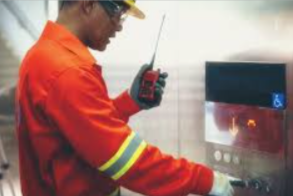
Elevator and Escalator Installers and Repairers
Required Education: High school diploma or equivalent (minimum)
Job Outlook (2019-29): +7%
Median Annual Salary: $88,540
Elevator and escalator installers and repairers fix, maintain, and install escalators and elevators.
Job duties include reading blueprints, replacing faulty parts, testing equipment, and conducting safety inspections. These professionals usually specialize in repair, installation, or maintenance work. They need mechanical and troubleshooting skills, physical strength and stamina, and the ability to work at heights.
These careers often start with a four-year apprenticeship with a union, employer, or industry group. Apprentices learn about blueprint reading, electrical theory, elevator and escalator parts, and safety. Most states require elevator and escalator installers and repairers to hold a license. They also need ongoing training to keep abreast of industry technology changes.
Earning a professional certification through the National Association of Elevator Contractors or the National Association of Elevator Safety Authorities International may lead to career advancement.
3. RADIATION THERAPISTS
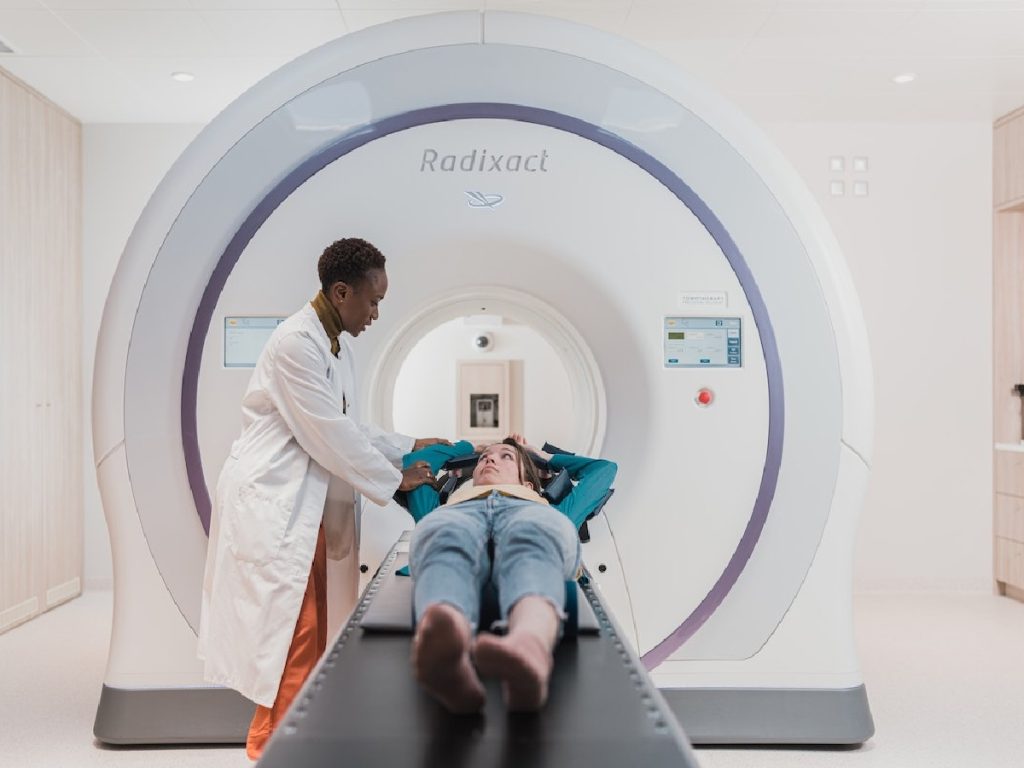
Radiation Therapists
Required Education: Associate degree
Job Outlook (2019-29): +7%
Median Annual Salary: $86,850
Radiation therapists provide radiation therapy to patients with cancer and other diseases. They explain treatment plans, use machines to treat patients, keep treatment records, and monitor patients for adverse reactions. Radiation therapists work in hospitals, physicians’ offices, and outpatient care centers. They need technical and interpersonal skills, physical stamina, and close attention to detail.
In trade school, students learn about pathology, treatment planning, oncology, and radiation physics. Radiation therapy associate programs teach students how to operate medical machinery, including hands-on experience in clinical settings.
Ranking among the highest-paid trade jobs, radiation therapists need a license in most states. To earn a license, they must graduate from an accredited radiation therapy program and pass a national certification exam. Radiation therapists can advance by completing certification and additional education to become medical dosimetrists who calculate radiation doses for cancer patients.
4. NUCLEAR MEDICINE TECHNOLOGISTS

Nuclear Medicine Technologists
Required Education: Associate degree
Job Outlook (2019-29): +5%
Median Annual Salary: $79,590
Nuclear medicine technologists work in hospitals, physicians’ offices, medical labs, and outpatient care centers. They also support physicians in preparing and administering radiopharmaceutical drugs. Job duties also include explaining procedures to patients, operating imaging equipment, keeping patient records, and maintaining safety standards.
Nuclear medicine technology students gain laboratory, clinical, and academic experience in trade school. They learn about regulatory compliance, radiation protection standards, and the preparation and administration of radioactive drugs. Nuclear medicine technologists follow safety procedures and use personal protective equipment to prevent accidental radiation exposure.
Although the field requires an associate degree at a minimum, many nuclear medicine technologists earn a bachelor’s. Some employers require graduation from a program accredited by the Joint Review Committee on Educational Programs in Nuclear Medicine Technology. Most nuclear medicine technologists pursue certification. However, licensing requirements vary by state.
5. DENTAL HYGIENISTS

Dental Hygienists
Required Education: Associate degree
Job Outlook (2019-29): +6%
Median Annual Salary: $77,090
Working under the supervision of a dentist, dental hygienists provide preventive care and look for dental disease in patients. They use various tools to remove plaque, take x-rays, apply fluoride, and educate patients on oral hygiene. Common employers include private dental offices, community health clinics, and public health facilities.
Dental hygienist trade school usually takes three years and includes classroom, clinical, and laboratory instruction. These programs also require classes in anatomy and physiology, periodontics, radiography, and patient management.
Dental hygienists need a license in every state. Licensure often requires students to obtain an associate degree accredited by the Commission on Dental Accreditation and pass an exam. While job duties vary, some states allow hygienists to administer anesthetics, remove sutures, and place fillings. They can advance in their careers by earning a bachelor’s or transitioning from direct patient care into management roles.
6. ELECTRICAL AND ELECTRONICS ENGINEERING TECHNICIANS

Electrical and Electronics Engineering Technicians
Required Education: Associate degree
Job Outlook (2019-29): +2%
Median Annual Salary: $67,550
These professionals help engineers create electronic and electrical equipment like computers, medical monitoring devices, and navigational equipment. Typical duties include building electrical instruments, drawing diagrams, making parts using machine tools, and performing preventative maintenance. Electrical and electronics engineering technicians work in manufacturing, research and development, engineering services, and the federal government.
In trade school, students learn to read blueprints and engineering instructions, write reports, and record data. They take classes in physics, programming languages, circuitry, and chemistry. Some electrical and electronic engineering programs hold accreditation from the Technology Accreditation Commission of the Accreditation Board for Engineering and Technology.
Electrical and electronic engineering technicians need mechanical, logical thinking, and observational skills. To demonstrate advanced knowledge in the field, technicians may apply for certifications from the National Institute for Certification in Engineering Technologies, the International Society of Automation, and ETA International.
7. AIRCRAFT AND AVIONICS EQUIPMENT MECHANICS AND TECHNICIANS
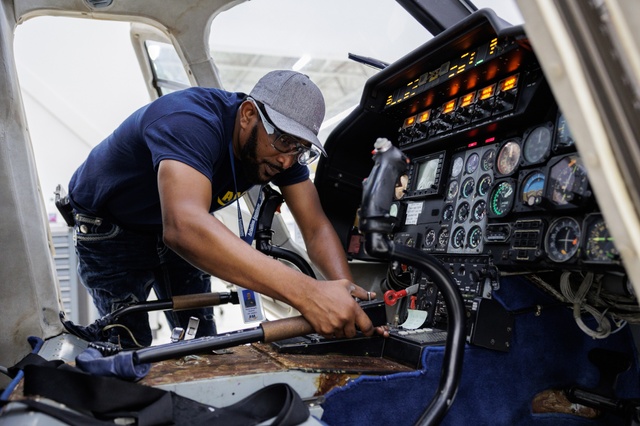
Aircraft and Avionics Equipment Mechanics and Technicians
Required Education: Trade school and/or associate degree
Job Outlook (2019-29): +5%
Median Annual Salary: $66,680
Aircraft and avionics equipment mechanics and technicians perform maintenance and make repairs on aircraft. Some inspect aircraft according to Federal Aviation Administration (FAA) specifications. Aircraft mechanics find electrical and mechanical problems, repair aircraft components, and use diagnostic equipment to test aircraft parts. Avionics technicians test electronic instruments, install instrument panels, repair components, and keep records.
Major employers include aerospace parts manufacturers, support services for air transportation, scheduled air transportation, and the federal government. Employees work in airfields, hangars, and repair stations, usually near major airports.
Most aircraft and avionics equipment mechanics and technicians attend an FAA-approved aviation maintenance trade school and earn an associate degree. Aircraft mechanics complete an FAA certification or work under the supervision of a certified mechanic. Mechanics with an inspector authorization face excellent career advancement prospects.
8. BOILERMAKERS
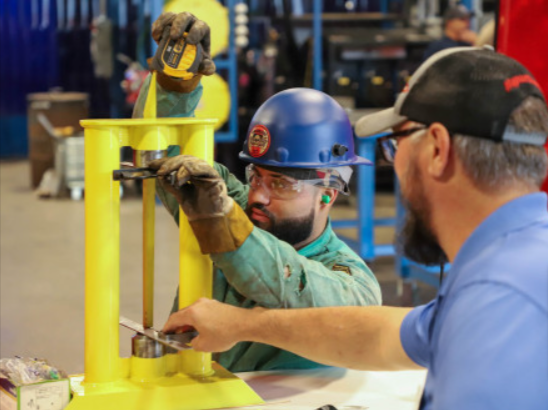
Boilermakers
Required Education: High school diploma or equivalent
Job Outlook (2019-29): +1%
Median Annual Salary: $65,360
Boilermakers assemble, repair, and maintain boilers and other large containers used in buildings, ships, and factories. Typical duties include reading blueprints, testing boiler systems for leaks, replacing broken parts, and cleaning vessels.
The labor-intensive work often occurs outside in all weather conditions. Job duties require physical stamina and adherence to safety precautions to avoid injury. Boilermakers work in utility system construction, nonresidential building construction, fabricated metal product manufacturing, and plumbing, heating, and air conditioning.
Boilermakers receive technical training and education through a four-year apprenticeship. They learn to use boilermaker tools, follow safety practices, read and sketch blueprints, and follow installation techniques. Boilermaker apprentices gain skills in welding, knot-tying, rigging, and fabrication. The International Brotherhood of Boilermakers offers a national apprenticeship program. Workers with a background in welding, pipefitting, or sheet metal work may qualify for a shortened apprenticeship.
9. CONSTRUCTION AND BUILDING INSPECTORS

Construction and Building Inspectors
Required Education: High school diploma or equivalent (minimum)
Job Outlook (2019-29): +3%
Median Annual Salary: $62,860
Construction and building inspectors ensure that construction projects comply with building ordinances, zoning codes, and other regulations. They spend most of their time at worksites inspecting buildings, bridges, highways, and water systems. They also examine electrical, plumbing, and heating/air conditioning systems. Other tasks include approving building plans, inspecting plumbing and electrical systems for problems, and issuing notices for non-compliant buildings.
Construction and building inspectors specialize in home inspection, electrical inspection, building inspection, and plans examination. They work for local or state government, engineering services, construction companies, or are self-employed.
Students in construction and building inspection trade programs learn to interpret building codes and conduct inspections. Most states require building and construction inspectors to hold licensure or certifications and take continuing education courses. Obtaining additional education and experience in the field may offer the best chances for advancement.
10. ELECTRICIANS
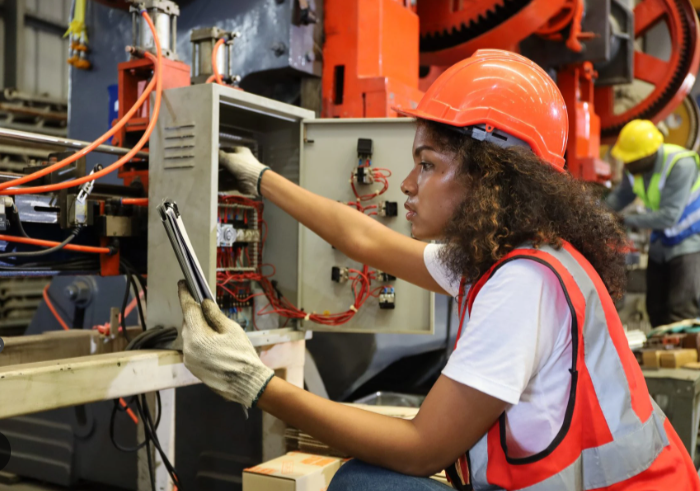
Electricians
Required Education: High school diploma or equivalent (minimum)
Job Outlook (2019-29): +8%
Median Annual Salary: $56,900
Electricians fix, maintain, and install electrical power, lighting, communication, and control systems in buildings. Trainees typically complete a four- or five-year apprenticeship. Some attend a technical program covering basic electrical information, circuitry, and safety, followed by a shorter apprenticeship.
Electrician apprenticeships include paid on-the-job training and technical instruction. Electricians who complete a trade program may qualify for a shorter apprenticeship. They gain skills in fire alarm systems, soldering, electrical code requirements, and blueprint reading. Unions and contractor associations offer electrician apprenticeships. Electricians who complete apprenticeships can qualify as journey workers and work without supervision.
Requirements vary, but most states require electricians to pass a test and earn a license. Electricians advance from journey workers to master electricians after completing a certain number of field hours.

CPAP: The Ultimate Preparation Support Program
The Comprehensive Preparation Assistance Program (CPAP) helps high school students who want to enroll in technical institutions by offering them individualized counseling and academic and financial aid support.
CPAP equips students with the information and tools they need for success in their chosen fields.
Sign up now!

